Shirong Ma
Insights into DeepSeek-V3: Scaling Challenges and Reflections on Hardware for AI Architectures
May 14, 2025

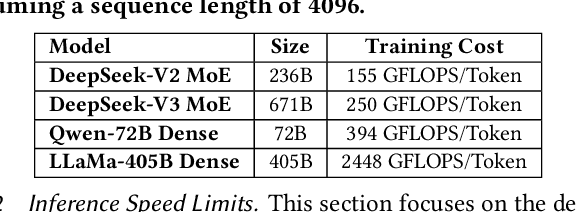
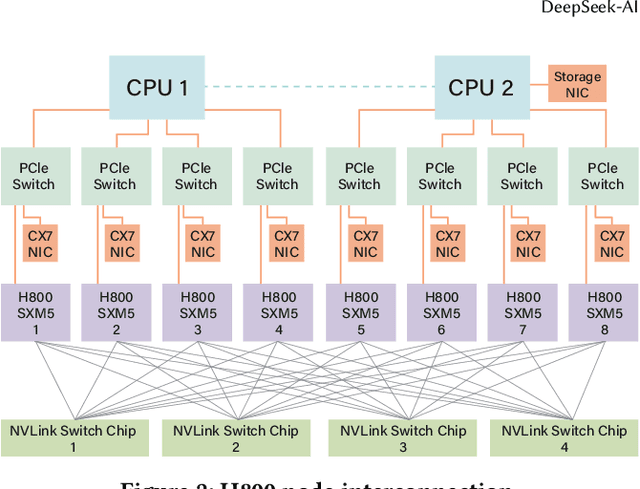
Abstract:The rapid scaling of large language models (LLMs) has unveiled critical limitations in current hardware architectures, including constraints in memory capacity, computational efficiency, and interconnection bandwidth. DeepSeek-V3, trained on 2,048 NVIDIA H800 GPUs, demonstrates how hardware-aware model co-design can effectively address these challenges, enabling cost-efficient training and inference at scale. This paper presents an in-depth analysis of the DeepSeek-V3/R1 model architecture and its AI infrastructure, highlighting key innovations such as Multi-head Latent Attention (MLA) for enhanced memory efficiency, Mixture of Experts (MoE) architectures for optimized computation-communication trade-offs, FP8 mixed-precision training to unlock the full potential of hardware capabilities, and a Multi-Plane Network Topology to minimize cluster-level network overhead. Building on the hardware bottlenecks encountered during DeepSeek-V3's development, we engage in a broader discussion with academic and industry peers on potential future hardware directions, including precise low-precision computation units, scale-up and scale-out convergence, and innovations in low-latency communication fabrics. These insights underscore the critical role of hardware and model co-design in meeting the escalating demands of AI workloads, offering a practical blueprint for innovation in next-generation AI systems.
DeepSeek-Prover-V2: Advancing Formal Mathematical Reasoning via Reinforcement Learning for Subgoal Decomposition
Apr 30, 2025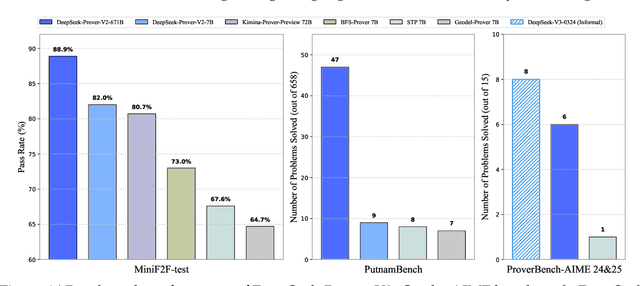
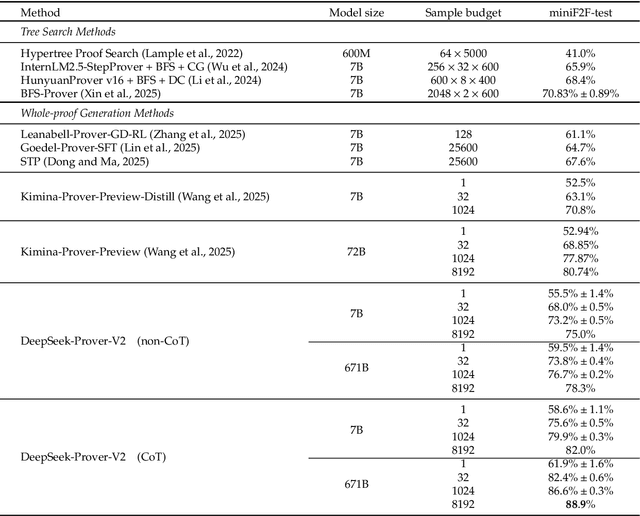

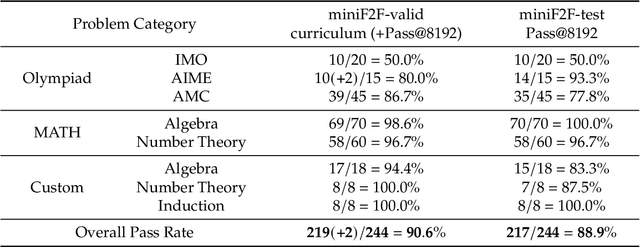
Abstract:We introduce DeepSeek-Prover-V2, an open-source large language model designed for formal theorem proving in Lean 4, with initialization data collected through a recursive theorem proving pipeline powered by DeepSeek-V3. The cold-start training procedure begins by prompting DeepSeek-V3 to decompose complex problems into a series of subgoals. The proofs of resolved subgoals are synthesized into a chain-of-thought process, combined with DeepSeek-V3's step-by-step reasoning, to create an initial cold start for reinforcement learning. This process enables us to integrate both informal and formal mathematical reasoning into a unified model. The resulting model, DeepSeek-Prover-V2-671B, achieves state-of-the-art performance in neural theorem proving, reaching 88.9% pass ratio on the MiniF2F-test and solving 49 out of 658 problems from PutnamBench. In addition to standard benchmarks, we introduce ProverBench, a collection of 325 formalized problems, to enrich our evaluation, including 15 selected problems from the recent AIME competitions (years 24-25). Further evaluation on these 15 AIME problems shows that the model successfully solves 6 of them. In comparison, DeepSeek-V3 solves 8 of these problems using majority voting, highlighting that the gap between formal and informal mathematical reasoning in large language models is substantially narrowing.
Inference-Time Scaling for Generalist Reward Modeling
Apr 03, 2025Abstract:Reinforcement learning (RL) has been widely adopted in post-training for large language models (LLMs) at scale. Recently, the incentivization of reasoning capabilities in LLMs from RL indicates that $\textit{proper learning methods could enable effective inference-time scalability}$. A key challenge of RL is to obtain accurate reward signals for LLMs in various domains beyond verifiable questions or artificial rules. In this work, we investigate how to improve reward modeling (RM) with more inference compute for general queries, i.e. the $\textbf{inference-time scalability of generalist RM}$, and further, how to improve the effectiveness of performance-compute scaling with proper learning methods. For the RM approach, we adopt pointwise generative reward modeling (GRM) to enable flexibility for different input types and potential for inference-time scaling. For the learning method, we propose Self-Principled Critique Tuning (SPCT) to foster scalable reward generation behaviors in GRMs through online RL, to generate principles adaptively and critiques accurately, resulting in $\textbf{DeepSeek-GRM}$ models. Furthermore, for effective inference-time scaling, we use parallel sampling to expand compute usage, and introduce a meta RM to guide voting process for better scaling performance. Empirically, we show that SPCT significantly improves the quality and scalability of GRMs, outperforming existing methods and models in various RM benchmarks without severe biases, and could achieve better performance compared to training-time scaling. DeepSeek-GRM still meets challenges in some tasks, which we believe can be addressed by future efforts in generalist reward systems. The models will be released and open-sourced.
DeepSeek-V3 Technical Report
Dec 27, 2024



Abstract:We present DeepSeek-V3, a strong Mixture-of-Experts (MoE) language model with 671B total parameters with 37B activated for each token. To achieve efficient inference and cost-effective training, DeepSeek-V3 adopts Multi-head Latent Attention (MLA) and DeepSeekMoE architectures, which were thoroughly validated in DeepSeek-V2. Furthermore, DeepSeek-V3 pioneers an auxiliary-loss-free strategy for load balancing and sets a multi-token prediction training objective for stronger performance. We pre-train DeepSeek-V3 on 14.8 trillion diverse and high-quality tokens, followed by Supervised Fine-Tuning and Reinforcement Learning stages to fully harness its capabilities. Comprehensive evaluations reveal that DeepSeek-V3 outperforms other open-source models and achieves performance comparable to leading closed-source models. Despite its excellent performance, DeepSeek-V3 requires only 2.788M H800 GPU hours for its full training. In addition, its training process is remarkably stable. Throughout the entire training process, we did not experience any irrecoverable loss spikes or perform any rollbacks. The model checkpoints are available at https://github.com/deepseek-ai/DeepSeek-V3.
DeepSeek-Coder-V2: Breaking the Barrier of Closed-Source Models in Code Intelligence
Jun 17, 2024



Abstract:We present DeepSeek-Coder-V2, an open-source Mixture-of-Experts (MoE) code language model that achieves performance comparable to GPT4-Turbo in code-specific tasks. Specifically, DeepSeek-Coder-V2 is further pre-trained from an intermediate checkpoint of DeepSeek-V2 with additional 6 trillion tokens. Through this continued pre-training, DeepSeek-Coder-V2 substantially enhances the coding and mathematical reasoning capabilities of DeepSeek-V2, while maintaining comparable performance in general language tasks. Compared to DeepSeek-Coder-33B, DeepSeek-Coder-V2 demonstrates significant advancements in various aspects of code-related tasks, as well as reasoning and general capabilities. Additionally, DeepSeek-Coder-V2 expands its support for programming languages from 86 to 338, while extending the context length from 16K to 128K. In standard benchmark evaluations, DeepSeek-Coder-V2 achieves superior performance compared to closed-source models such as GPT4-Turbo, Claude 3 Opus, and Gemini 1.5 Pro in coding and math benchmarks.
Rethinking the Roles of Large Language Models in Chinese Grammatical Error Correction
Feb 18, 2024



Abstract:Recently, Large Language Models (LLMs) have been widely studied by researchers for their roles in various downstream NLP tasks. As a fundamental task in the NLP field, Chinese Grammatical Error Correction (CGEC) aims to correct all potential grammatical errors in the input sentences. Previous studies have shown that LLMs' performance as correctors on CGEC remains unsatisfactory due to its challenging task focus. To promote the CGEC field to better adapt to the era of LLMs, we rethink the roles of LLMs in the CGEC task so that they can be better utilized and explored in CGEC. Considering the rich grammatical knowledge stored in LLMs and their powerful semantic understanding capabilities, we utilize LLMs as explainers to provide explanation information for the CGEC small models during error correction to enhance performance. We also use LLMs as evaluators to bring more reasonable CGEC evaluations, thus alleviating the troubles caused by the subjectivity of the CGEC task. In particular, our work is also an active exploration of how LLMs and small models better collaborate in downstream tasks. Extensive experiments and detailed analyses on widely used datasets verify the effectiveness of our thinking intuition and the proposed methods.
Mitigating Catastrophic Forgetting in Multi-domain Chinese Spelling Correction by Multi-stage Knowledge Transfer Framework
Feb 18, 2024Abstract:Chinese Spelling Correction (CSC) aims to detect and correct spelling errors in given sentences. Recently, multi-domain CSC has gradually attracted the attention of researchers because it is more practicable. In this paper, we focus on the key flaw of the CSC model when adapting to multi-domain scenarios: the tendency to forget previously acquired knowledge upon learning new domain-specific knowledge (i.e., catastrophic forgetting). To address this, we propose a novel model-agnostic Multi-stage Knowledge Transfer (MKT) framework, which utilizes a continuously evolving teacher model for knowledge transfer in each domain, rather than focusing solely on new domain knowledge. It deserves to be mentioned that we are the first to apply continual learning methods to the multi-domain CSC task. Experiments prove the effectiveness of our proposed method, and further analyses demonstrate the importance of overcoming catastrophic forgetting for improving the model performance.
When LLMs Meet Cunning Questions: A Fallacy Understanding Benchmark for Large Language Models
Feb 16, 2024



Abstract:Recently, Large Language Models (LLMs) have made remarkable evolutions in language understanding and generation. Following this, various benchmarks for measuring all kinds of capabilities of LLMs have sprung up. In this paper, we challenge the reasoning and understanding abilities of LLMs by proposing a FaLlacy Understanding Benchmark (FLUB) containing cunning questions that are easy for humans to understand but difficult for models to grasp. Specifically, the cunning questions that FLUB focuses on mainly consist of the tricky, humorous, and misleading questions collected from the real internet environment. And we design three tasks with increasing difficulty in the FLUB benchmark to evaluate the fallacy understanding ability of LLMs. Based on FLUB, we investigate the performance of multiple representative and advanced LLMs, reflecting our FLUB is challenging and worthy of more future study. Interesting discoveries and valuable insights are achieved in our extensive experiments and detailed analyses. We hope that our benchmark can encourage the community to improve LLMs' ability to understand fallacies.
DeepSeek LLM: Scaling Open-Source Language Models with Longtermism
Jan 05, 2024



Abstract:The rapid development of open-source large language models (LLMs) has been truly remarkable. However, the scaling law described in previous literature presents varying conclusions, which casts a dark cloud over scaling LLMs. We delve into the study of scaling laws and present our distinctive findings that facilitate scaling of large scale models in two commonly used open-source configurations, 7B and 67B. Guided by the scaling laws, we introduce DeepSeek LLM, a project dedicated to advancing open-source language models with a long-term perspective. To support the pre-training phase, we have developed a dataset that currently consists of 2 trillion tokens and is continuously expanding. We further conduct supervised fine-tuning (SFT) and Direct Preference Optimization (DPO) on DeepSeek LLM Base models, resulting in the creation of DeepSeek Chat models. Our evaluation results demonstrate that DeepSeek LLM 67B surpasses LLaMA-2 70B on various benchmarks, particularly in the domains of code, mathematics, and reasoning. Furthermore, open-ended evaluations reveal that DeepSeek LLM 67B Chat exhibits superior performance compared to GPT-3.5.
EcomGPT-CT: Continual Pre-training of E-commerce Large Language Models with Semi-structured Data
Dec 25, 2023Abstract:Large Language Models (LLMs) pre-trained on massive corpora have exhibited remarkable performance on various NLP tasks. However, applying these models to specific domains still poses significant challenges, such as lack of domain knowledge, limited capacity to leverage domain knowledge and inadequate adaptation to domain-specific data formats. Considering the exorbitant cost of training LLMs from scratch and the scarcity of annotated data within particular domains, in this work, we focus on domain-specific continual pre-training of LLMs using E-commerce domain as an exemplar. Specifically, we explore the impact of continual pre-training on LLMs employing unlabeled general and E-commercial corpora. Furthermore, we design a mixing strategy among different data sources to better leverage E-commercial semi-structured data. We construct multiple tasks to assess LLMs' few-shot In-context Learning ability and their zero-shot performance after instruction tuning in E-commerce domain. Experimental results demonstrate the effectiveness of continual pre-training of E-commerce LLMs and the efficacy of our devised data mixing strategy.
 Add to Chrome
Add to Chrome Add to Firefox
Add to Firefox Add to Edge
Add to Edge